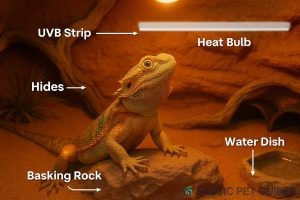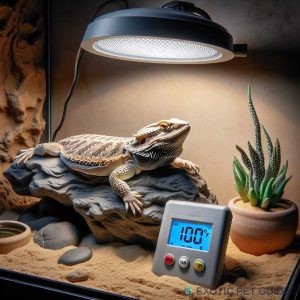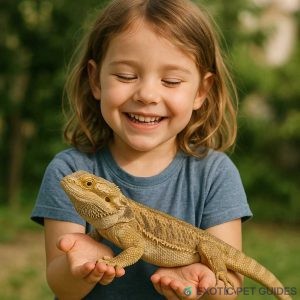🦎 Introduction
So you’re thinking about getting a Bearded Dragon? Great choice!
Beardies (as fans call them) are:
- Friendly
- Easy to handle
- Diurnal (awake during the day)
- Perfect for beginners
In this care guide, you’ll learn how to properly set up their enclosure, feed them a balanced diet, and interact with them safely.

🏡 Tank Setup Basics
📏 Minimum Tank Size
| Age/Size | Minimum Tank Size |
|---|---|
| Baby (0–5 mo.) | 20–40 gallon |
| Juvenile | 40–55 gallon |
| Adult (1+ year) | 75–120 gallon (4 ft) |
🧠 Pro Tip: Bigger is always better! A 4’x2’x2′ enclosure is ideal for adults.
🧱 Enclosure Must-Haves
- Front-opening glass or PVC tank
- Secure mesh top for airflow
- Basking platform + hiding spots
- Climbing branches / decor
- Dry, non-loose substrate (e.g., tile or reptile carpet for beginners)

☀️ Lighting & Heating
Beardies are desert reptiles, and need both UVB and proper heat gradients.
🔥 Heat Zones
| Zone | Ideal Temp |
|---|---|
| Basking area | 95–105°F (35–40°C) |
| Cool side | 75–85°F (24–29°C) |
| Nighttime | 65–75°F (18–24°C) |
Use a basking bulb + a T5 HO UVB strip light.
- UVB should cover at least 2/3 of the tank
- Replace every 6–12 months

🥬 Feeding Guide
Bearded dragons are omnivores—they eat both insects and greens.
🔄 Diet by Age
| Age | Insects % | Greens % |
|---|---|---|
| 0–6 months | 70% | 30% |
| 6–12 months | 50% | 50% |
| Adult (1+) | 20% | 80% |
✅ Safe Foods
Insects (gut-loaded & dusted):
- Dubia roaches
- Crickets
- Black soldier fly larvae
- Hornworms (treat)
Greens & Veggies:
- Collard, mustard, turnip greens
- Squash, bell peppers
- Dandelion leaves
- Avoid spinach, iceberg lettuce

💊 Supplements
Beardies need calcium to prevent metabolic bone disease (MBD):
- Calcium with D3: 4–5x/week (for indoor dragons)
- Multivitamin powder: 1x/week
- Always dust insects before feeding
🧼 Cleaning & Maintenance
| Task | Frequency |
|---|---|
| Spot clean poop | Daily |
| Change water dish | Daily |
| Deep clean tank | Every 2–4 weeks |
| Replace UVB bulb | Every 6–12 mo. |
🖐️ Handling Tips
Bearded dragons are known for being calm and social!
Do:
- Support their full body when lifting
- Handle gently but confidently
- Let them explore your hands or arms
Don’t:
- Grab from above (they see it as predatory)
- Chase or restrain tightly
- Handle right after eating

❤️ Behavior & Bonding
Beardies show emotion through body language:
- Head bob = dominance or alertness
- Arm wave = submission
- Beard darkening = stress or excitement
- Glass surfing = boredom or tank issue
They can recognize their humans and enjoy attention—some even fall asleep on their owners!

✅ Pros & Cons Summary
| Pros | Cons |
|---|---|
| Friendly & interactive | Large tank needed for adults |
| Easy to feed (variety) | Requires UVB & heat setup |
| Good for kids & beginners | Moderate upfront cost ($300–600) |
| Long lifespan (8–12 years) | Can become lazy if under-stimulated |